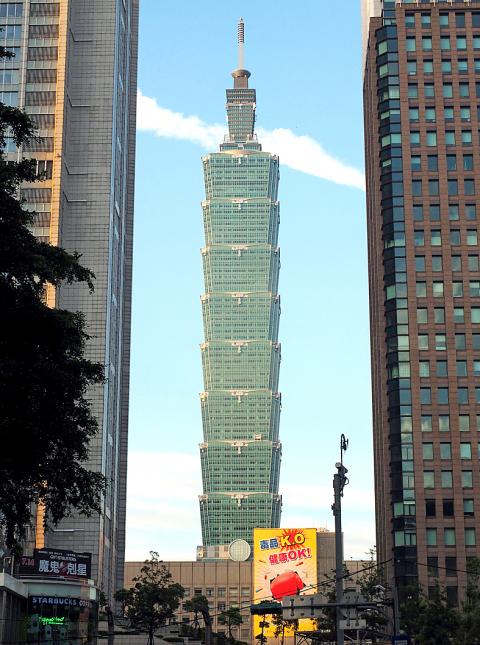Taipei 101 was on Thursday awarded the top honor in the Leadership in Energy and Environmental Design (LEED) building rating system, achieving the highest level — platinum — in the category of operation and maintenance of an existing building.
LEED is a green building certification program based on a rating system for design, construction, operation and maintenance of environmentally friendly buildings.
Projects receive ratings on one of four levels — certified, silver, gold and platinum.

Photo: EPA
Having received a platinum LEED v3 rating in 2011, the skyscraper moved up one spot to attain a LEED v4 rating this year, becoming the first skyscraper outside of the US and the only building in Taiwan to have achieved the feat, according to the organizer of the awards, the US Green Building Council (USGBC).
“With such distinguished leadership, Taipei 101 is showing it can stand taller among its peers without adding a single floor,” USGBC founder, chief executive and chairman Rick Fedrizzi said.
Besides evaluating figures that show how much more energy a building saves compared with a LEED v3 rating, the higher grade requires the candidate to reach out to the local community to build a green network, said Tim Shen, director of head of sustainability at the Asia office of CBRE, a company which provides real-estate services.
Having provided consultation to Taipei 101 on how the achieve the rating, Shen said the skyscraper signed a memorandum of understanding with state-run Taiwan Power Co (Taipower) last year to create a “demand response” partnership.
Under such cooperation, when electricity demand rises suddenly, the building follows a standard operating procedure to lower its usage for a designated period, Shen said.
The module could be implemented by Taipower and other buildings in Taiwan, he said.
Taipei 101 said that although its occupancy rate increased to 95.79 percent at the end of last year, a 50,000m2 increase compared with 2007, the building has saved 262 gigawatts per hour of electricity.
It is equivalent to a reduction of 139,083 tonnes of carbon emissions, which is Daan Forest Park’s total carbon absorption over 357 years, it said.
LEED-certified buildings are resource efficient. They use less water and energy, and reduce greenhouse gas emissions. As an added bonus, they save money, according to the USGBC Web site.

Japanese footwear brand Onitsuka Tiger today issued a public apology and said it has suspended an employee amid allegations that the staff member discriminated against a Vietnamese customer at its Taipei 101 store. Posting on the social media platform Threads yesterday, a user said that an employee at the store said that “those shoes are very expensive” when her friend, who is a migrant worker from Vietnam, asked for assistance. The employee then ignored her until she asked again, to which she replied: "We don't have a size 37." The post had amassed nearly 26,000 likes and 916 comments as of this

US President Donald Trump said "it’s up to" Chinese President Xi Jinping (習近平) what China does on Taiwan, but that he would be "very unhappy" with a change in the "status quo," the New York Times said in an interview published yesterday. Xi "considers it to be a part of China, and that’s up to him what he’s going to be doing," Trump told the newspaper on Wednesday. "But I’ve expressed to him that I would be very unhappy if he did that, and I don’t think he’ll do that," he added. "I hope he doesn’t do that." Trump made the comments in

Tourism in Kenting fell to a historic low for the second consecutive year last year, impacting hotels and other local businesses that rely on a steady stream of domestic tourists, the latest data showed. A total of 2.139 million tourists visited Kenting last year, down slightly from 2.14 million in 2024, the data showed. The number of tourists who visited the national park on the Hengchun Peninsula peaked in 2015 at 8.37 million people. That number has been below 2.2 million for two years, although there was a spike in October last year due to multiple long weekends. The occupancy rate for hotels

A cold surge advisory was today issued for 18 cities and counties across Taiwan, with temperatures of below 10°C forecast during the day and into tonight, the Central Weather Administration (CWA) said. New Taipei City, Taipei, Taoyuan and Hsinchu, Miaoli and Yilan counties are expected to experience sustained temperatures of 10°C or lower, the CWA said. Temperatures are likely to temporarily drop below 10°C in most other areas, except Taitung, Pingtung, Penghu and Lienchiang (Matsu) counties, CWA data showed. The cold weather is being caused by a strong continental cold air mass, combined with radiative cooling, a process in which heat escapes from